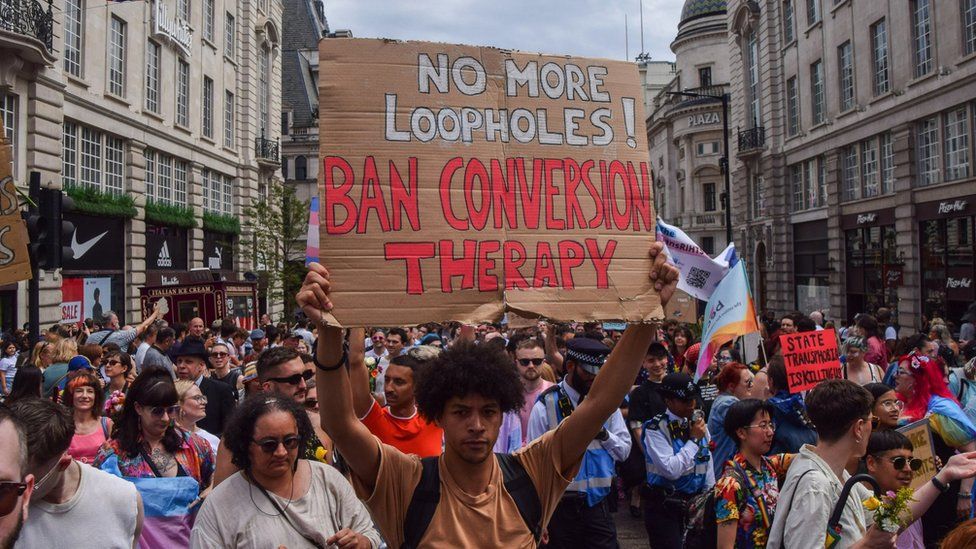ARTICLE AD BOX
 Image source, Getty Images
Image source, Getty Images
Campaigners had been hoping the ban would be included in the King's Speech
By Lauren Moss, LGBT correspondent & Josh Parry, LGBT producer
BBC News
A ban on conversion therapy practices has not been included in the King's Speech, which sets out laws ministers want to pass in the year ahead.
The legislation, first promised in 2018, now looks unlikely to become law before the next general election.
It follows 18 months of speculation about what the bill would include and when it would be published.
A government spokesperson called it a "complex issue" which they are "carefully considering".
Conversion therapy, sometimes called "reparative therapy" or "gay cure therapy", involves practices which attempt to alter or suppress a person's sexual orientation or gender identity.
Treatment can include prayer or talking therapies, but more extreme practices have been documented, including exorcism, physical violence and starvation.
Major medical institutions, including NHS England and the Royal College of Psychiatrists, have warned all types of conversion therapy are "unethical and potentially harmful".
Campaigners had been hoping a ban on conversion therapy would be announced in the King's Speech, which outlines the government's priorities for the forthcoming session of Parliament.
The government has previously described the therapy as "abhorrent". It first pledged to outlaw it in England and Wales 2018 as part of its LGBT+ Action Plan, and later reaffirmed its plans in the Queen's Speech 2022.
There have been several U-turns over what form any legislation would take, after three members of the now-disbanded LGBT advisory panel quit over the government's handling of LGBT rights and amid claims it was "dragging its feet" over the ban.
Its lack of inclusion in the King's Speech is thought to be over disagreements within the Conservative Party about what form a ban should take, and concerns over how it could impact freedom of expression around issues such as gender identity, as well as any potential impact on religious freedoms.
The BBC understands that following media speculation reporting a ban would be announced, a group of MPs, including Miriam Cates, MP for Penistone and Stocksbridge, met to discuss their opposition to the bill and ask the prime minister for it not to be included.
Image source, Getty Images
Image caption,King Charles III sits beside Queen Camilla as he reads the King's Speech
Campaigners hoping the practice would be outlawed say the government's decision not to legislate for a ban is "an act of frightful negligence".
Robbie de Santos, Director of External Affairs at Stonewall, said: "[The government] has given the green light for the abuse against LGBTQ+ people to continue unchecked.
"Rather than getting mired in a cynical cultural war, it should be making decisions based on what the evidence and expertise said."
However, the Christian Institute, who have campaigned against a ban, say the legislation would "seriously impact" free speech.
Simon Calvert, deputy director at the Christian Institute, said: "Any legislation going further than the existing law would seriously impact free speech, religious freedom, freedom of association, and the rights of parents."
"It's time to ditch this legislation once and for all."
A government spokesman said: "No one in this country should be harmed or harassed for who they are, and attempts at so-called 'conversion therapy' are abhorrent.
"That is why we are carefully considering this very complex issue."

 1 year ago
27
1 year ago
27








 English (US) ·
English (US) ·